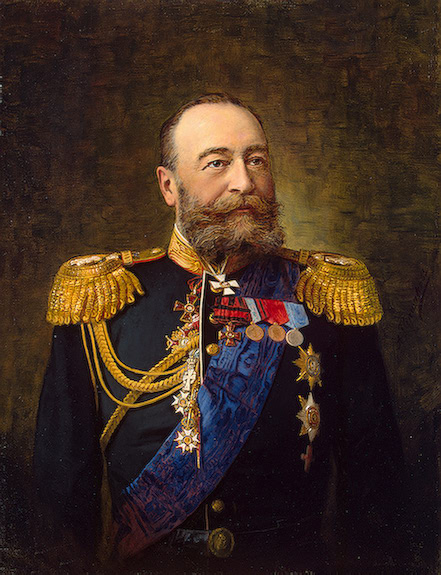<Back to Index>
- Admiral of the Imperial Russian Navy Yevgeni Ivanovich Alekseyev, 1843
PAGE SPONSOR

Yevgeni Ivanovich Alekseyev or Alexeyev (Russian: Евге́ний Ива́нович Алексе́ев (May 23 [O.S. May 11] 1843 – May 27, 1917) was an admiral in the Imperial Russian Navy, viceroy of the Russian Far East province, and commander of Russian forces at Port Arthur and in Manchuria during the first year of the Russo - Japanese War of 1904 - 05.
Alexeyev was an illegitimate son of Tsar Alexander II, raised by the family of Lieutenant Ivan Maximovich Alexeyev (1796 – 1849).
At the age of 13, Alexeyev attended the Sea Cadet Corps and completed his training three years later. He was assigned as a midshipman for four years to the screw corvette Varyag, on a world tour. He was commissioned as an ensign in 1867. After serving on numerous ships in the Imperial Russian Navy, he was given his first command in 1878: the cruiser Afrika, which he commanded on a voyage around the world from 1880 - 1883.
From 1883 - 1888 he served as a naval attaché to France, and was promoted to the rank of captain in 1886. After his return to Russia in 1889, he was given command of the protected cruiser Admiral Kornilov. In 1891, he made another round the world cruise, this time accompanied by the Tsarevich Nicholas (the future Tsar Nicholas II).
Alexeyev was promoted to rear admiral in 1892 and served on the General Staff of the Imperial Russian Navy, becoming vice admiral in 1894 and deputy chief of staff in 1895. From 1895 - 1897 he was made commander of the Russian Pacific Fleet, initially at Vladivostok, and from December 1897, from Port Arthur in the southern Liaodong Peninsula leased from Qing dynasty China. In 1898 he became governor of the Liaodong leased territory, and was again commander of the Russian Pacific Fleet from 1899. He participated in the suppression of the Boxer Rebellion and was promoted to Adjutant general. The failure of Russia to withdraw its forces from Manchuria after the end of the Boxer Rebellion further alarmed the Empire of Japan, still upset over the Triple Intervention and Russian de facto annexation of the Liaodong Peninsula and increasing Russian influence over Joseon dynasty Korea – all of which were considered detrimental to Japanese interests and security.
On August 13, 1903 Tsar Nicolas II appointed Alexeyev as viceroy in charge of all civil and military authority over Russian possessions in the Far East, including Russian - occupied Manchuria, the Liadong Peninsula, and Russia Amur Military District (present day Maritime Provinces). His exact functions were poorly defined, and "he himself was unclear about the extent of his autonomy. In any event Alekseyev, who already had been given in May very great powers of coordination, did not greatly welcome the new title and almost declined to accept it. Since Alexeyev showed extreme hostility towards Japan, supporting the desire of Russian industrialists to establish themselves in Korea, this was a clear signal to the Japanese government that Russia was not willing to negotiate any political concessions.
With the outbreak of the Russo - Japanese War on February 9, 1904, Alexeyev became commander of all Russian land and naval forces in the Far East. However, he had serious disagreements with General Kuropatkin, the former minister of war, over the strategy employed against the Japanese and forced Kuropatkin to take a more aggressive position despite Kuropatkin’s insistence on assuming a defensive war of attrition until the completion of the Trans - Siberian Railroad, which would bring reinforcements and supplies. After major defeats on sea and by land, Alexeyev was recalled to St. Petersburg on October 12, 1904.
In June 1905, Alexeyev became a member of the State Council of Imperial Russia. In April 1917, in the wake of the February Revolution and the abdication of the Tsar in March, he retired from public life. He died a few weeks later in Yalta, on 27 May 1917.